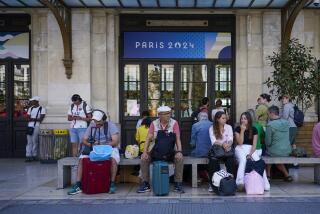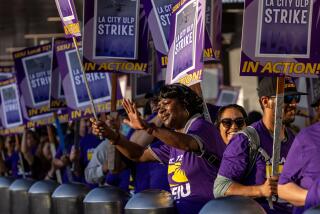London’s Soccer Fans Score With Transit Strike
- Share via
LONDON — A combination of World Cup fever and a public transportation strike brought the British capital close to a standstill on a day that had been dubbed “Idle Monday” before it even began.
In thin, cold rain, the streets here were clogged with cars, taxis and sodden pedestrians under umbrellas, as tens of thousands of people unable to get to work on the strike-bound subway trudged toward offices.
But many more did not bother. Firms that had not specially installed televisions--to let employees follow England’s game against Tunisia--were among the worst hit by record levels of absenteeism.
At least 14 million people, in a country of 58 million, were expected to tune in to the match. Surveys quoted in the British press said 1 in 5 workers planned to take time off to watch the game--with or without employers’ permission. Most agreed that the subway strike was a perfect excuse for Londoners with soccer on their mind to stay home.
“It’s obvious no one’s going to want to work when they could be home in front of the telly,” said LeRoy Charles, a driver at Regent’s Taxis. “I’m freelance, so I don’t even have to ask my boss. I’ll be knocking off at 12 on the dot and heading home.”
Newspapers were full of tongue-in-cheek stories about excuses most likely to be offered to bosses for being out on the day of England’s first World Cup match. No. 1? Grandmothers’ funerals, followed by medical excuses.
“Doctor’s notes, now as easy to come by as scratch cards, are apparently the fashionable way of bunking off work these days. But what if the doctor himself is off with a doctor’s note?” asked Daily Mail columnist Keith Waterhouse in a column headlined “Excuses, excuses, for the big day.”
“I feel sorry for anyone who really went down with raging flu this weekend,” he wrote. “For the rest of his career, he will be marked as a World Cup skiver. Promotion will pass him by. When redundancies [layoffs] are in the offing, he will be the first to be paid off. And he probably doesn’t even like soccer.”
*
Many here--their imaginations caught by the popular Labor government’s repeated comparisons between its own rule in today’s prosperous Britain and the glamorous highs of the swinging ‘60s--hope that their team this year, as England did in 1966, will win the Cup. To reinforce that link in voters’ minds, Geoff Hurst, the soccer star of 1966, was granted a knighthood over the weekend.
But the Cup exuberance here also was tempered by shame over 24 hours of violence between English and Tunisian fans at the game site in the southern French city of Marseilles. “There’s absolutely no excuse for it,” Prime Minister Tony Blair said of the rioting and the arrests of dozens of rowdy fans. “It’s a complete disgrace.”
The subway strike, set to last 48 hours, meant that only half the usual number of trains were running in London’s 243-mile underground system, which usually carries about 2 million Londoners to work every day.
Jimmy Knapp, head of the striking National Union of Rail, Maritime and Transport Workers, had predicted “complete stoppage” on the network as a result of the labor action to press claims for improved working conditions, job security and pensions after the network is partially privatized.
The London Chamber of Commerce, which had earlier predicted that the strike would cost $57 million, backtracked at midday Monday by saying that more workers than expected were showing up for work.
*
* WORLD CUP COVERAGE: C5-7
More to Read
Sign up for Essential California
The most important California stories and recommendations in your inbox every morning.
You may occasionally receive promotional content from the Los Angeles Times.










